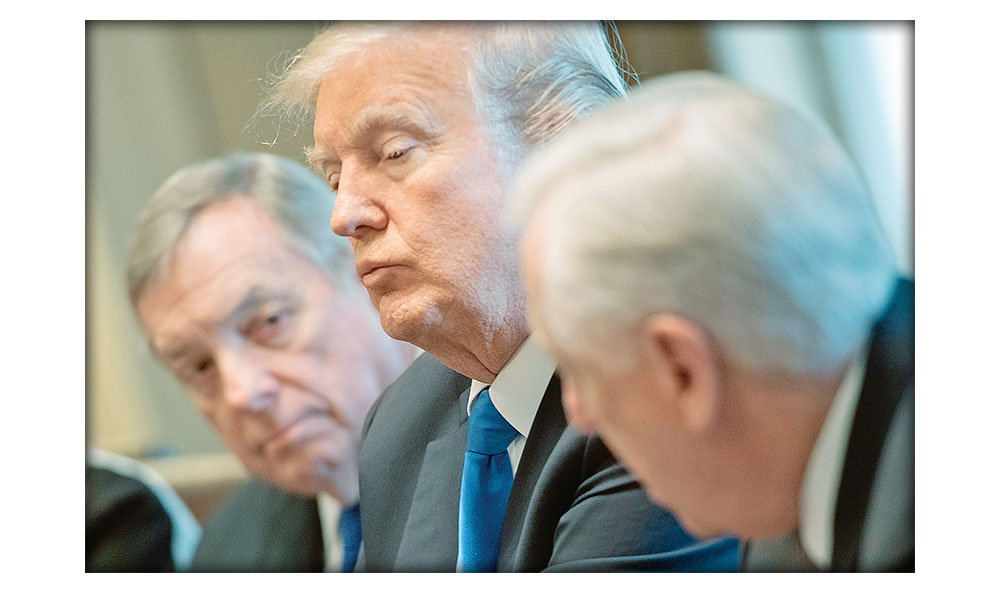MUSLIMS ENTER AMERICAN POLITICS
- 10 Nov - 16 Nov, 2018
One challenge to writing a column like this one, in these times, is the lag of a week or so between writing and publication. Events, reactions, counter-reactions and consequences fly about so fast and furious that it seems impossible to gain any topical traction or to avoid datedness.

The best solution I can think of, for now, is simply to pay attention and roll with it. The week during which I wrote this column began with a spasm of wishfulness that Oprah Winfrey would rescue America from its dysfunction by running for president. She apparently gave a wonderful speech at the Golden Globe awards, but the next presidential election is nearly three years away, and three years is a very long time these days. The inflexibility of the American election calendar was intended as a way of maintaining stability of governance, but what we’re learning is that under certain conditions it fosters the opposite.
Then we heard something about a possible loosening of U.S. policy on “usable” nuclear warheads, which sounds to me like a very bad idea. Then 200,000 people from El Salvador were rendered acutely more vulnerable to deportation. And then… and then, Donald Trump used a vulgar word to describe both the specific country where my education as a global citizen began (Haiti) and the entire continent where I happen to be travelling as I write this (Africa). Trump said what he said, by the way, the day before the anniversary of the 7.0 earthquake that killed some 300,000 people in Haiti in 2010.
I don’t have time or word count here to write any proper analysis or reaction, except to point out that truly useful analysis or reaction does, in fact, require more words and more time than most of us seem to have these days. If we really want to understand and address real issues in human society, we must give ourselves more time than it takes to compose a tweet. And we must read books. On the subject of immigrants from Haiti to the U.S., I highly recommend the memoir Brother, I’m Dying by the Haitian-American novelist Edwidge Danticat.
What gives the Trump phenomenon a sick fascination akin to watching a multi-car pileup on the freeway is that the man himself seems able to do, say, or tweet just about anything with impunity. Needless to say, that’s no way to govern a country. Expressing outrage is easy, which is why I’m not allowing myself to do merely that. I want – we need – to exercise the discipline of maintaining a longer and wider view of our situation. And the truth of our situation is that it’s not only, or not really, about Trump. Trump himself will be gone someday – hopefully someday soon – and the rest of us will be left to pick up the pieces.
The increasingly plaintive objections of America’s liberal class to the Trump regime’s policies are increasingly exasperating and irrelevant. What liberals are either unable or unwilling to understand is that, for Trump and his fellow travellers, it’s not about policy but about power. And the kind of power in question is no longer political power, per se, but brute power. Political power, per se, entails a measure of subtlety, as well as at least tacit agreement from all parties on the parameters for governing a society. What we should all be worried about is where the logic of brute power leads. As I write this I am in South Africa, and a few days ago I was in Rwanda – both countries whose histories offer instructive guidance on the matter.
There have been court rulings, including recently, ostensibly limiting or delaying the implementation of some of Trump’s plans. But these are arguably pointless, unless all parties respect the authority and independence of the judicial branch. Pakistani readers surely remember the crisis caused in their country when President Musharraf picked a fight with the judiciary by summarily dismissing Chief Justice Iftikhar Muhammad Chaudhry in March 2007. What we all know, but politely ignore, is that the legitimacy of the United States Supreme Court has already been fatally undermined by the year-long stonewalling of President Obama’s nomination to that bench of Merrick Garland, followed by Trump’s nomination (and the Republican-led Senate’s prompt confirmation) of Neil Gorsuch. And, truth be told, the U.S. Supreme Court has been compromised ever since the appalling Bush vs. Gore decision in the wake of the bitter and tainted presidential election of the year 2000.
I’m currently reading Munich, the new novel by the smart British thriller author Robert Harris. It’s a fictionalisation of the September 1938 crisis when British prime minister Neville Chamberlain temporarily avoided the start of World War II by meeting Hitler and returning to London declaring “peace in our time.” It’s instructive, or at least amusing, to read such a novel here and now.
In one scene German conspirators gather in a house in suburban Berlin to plot an overthrow that, sadly for the world, never happened in real life. A high-ranking general says: “The truth about Hitler, I came to realise over the summer, is that he actually wants war with Czechoslovakia.
He is under the delusion that he is some kind of military genius… The fellow should be taken somewhere secure and subjected to a thorough psychiatric examination. Then he can either be locked away in an asylum or made to account for his crimes.”
“But what shall we do with Hitler, gentlemen?” another of the conspirators asks.
“This is like arguing about what form of government we should have after the Third Reich,” someone else replies. “Will it be a monarchy or a democratic republic, or some combination of the two? The fact is, as the proverb says, before you can cook your rabbit you first have to catch it. Our absolute priority has to be stopping the madman …”
COMMENTS